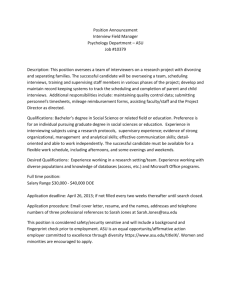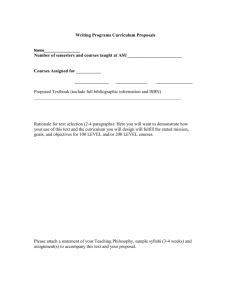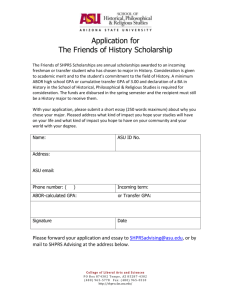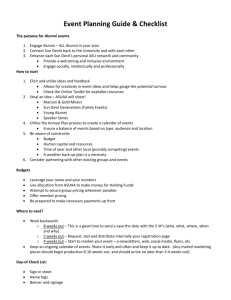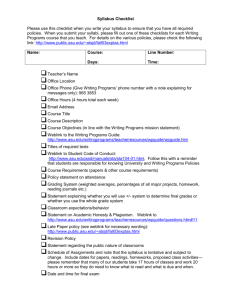2002 - WP Carey School of Business
advertisement
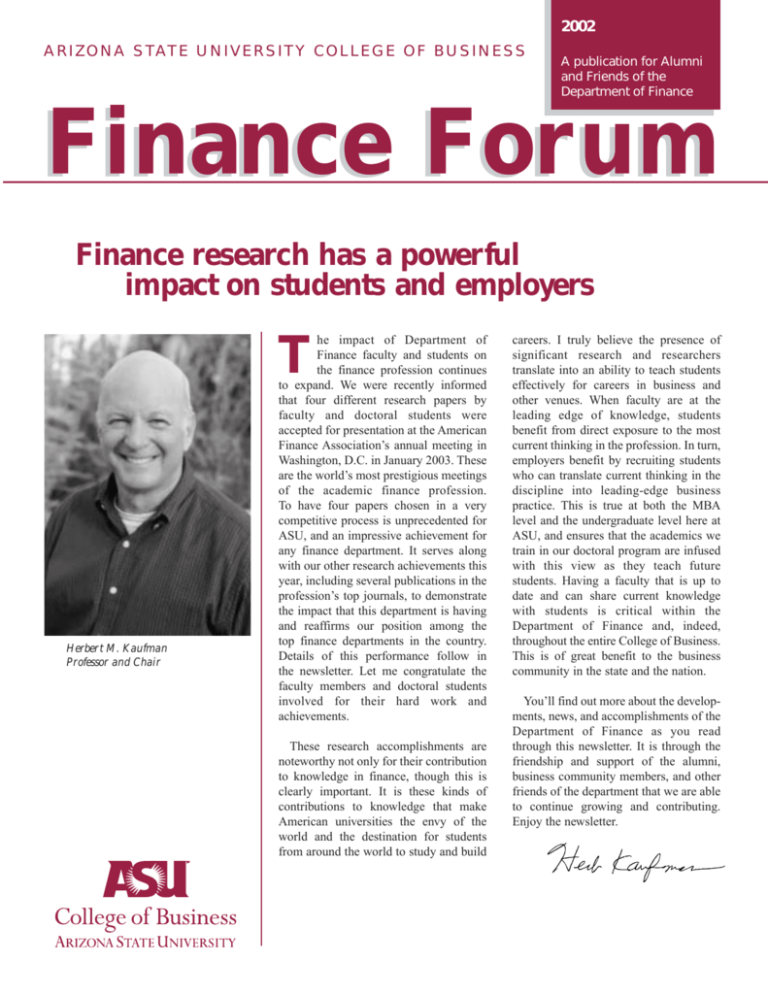
2002 A R I Z O N A S TAT E U N I V E R S I T Y C O L L E G E O F B U S I N E S S A publication for Alumni and Friends of the Department of Finance Finance Forum Finance research has a powerful impact on students and employers T Herbert M. Kaufman Professor and Chair he impact of Department of Finance faculty and students on the finance profession continues to expand. We were recently informed that four different research papers by faculty and doctoral students were accepted for presentation at the American Finance Association’s annual meeting in Washington, D.C. in January 2003. These are the world’s most prestigious meetings of the academic finance profession. To have four papers chosen in a very competitive process is unprecedented for ASU, and an impressive achievement for any finance department. It serves along with our other research achievements this year, including several publications in the profession’s top journals, to demonstrate the impact that this department is having and reaffirms our position among the top finance departments in the country. Details of this performance follow in the newsletter. Let me congratulate the faculty members and doctoral students involved for their hard work and achievements. These research accomplishments are noteworthy not only for their contribution to knowledge in finance, though this is clearly important. It is these kinds of contributions to knowledge that make American universities the envy of the world and the destination for students from around the world to study and build careers. I truly believe the presence of significant research and researchers translate into an ability to teach students effectively for careers in business and other venues. When faculty are at the leading edge of knowledge, students benefit from direct exposure to the most current thinking in the profession. In turn, employers benefit by recruiting students who can translate current thinking in the discipline into leading-edge business practice. This is true at both the MBA level and the undergraduate level here at ASU, and ensures that the academics we train in our doctoral program are infused with this view as they teach future students. Having a faculty that is up to date and can share current knowledge with students is critical within the Department of Finance and, indeed, throughout the entire College of Business. This is of great benefit to the business community in the state and the nation. You’ll find out more about the developments, news, and accomplishments of the Department of Finance as you read through this newsletter. It is through the friendship and support of the alumni, business community members, and other friends of the department that we are able to continue growing and contributing. Enjoy the newsletter. FOCUS ON ALUMNI Lutz among nation’s top 20 undergraduates An ASU senior who helped create a science education program for children in Panama has been chosen one of the top 20 undergraduates in the United States by USA Today. Brian Lutz of Mesa was named to the 2002 All-USA College Academic first team in the Feb. 27 issue. He is the seventh ASU student to be named to the first team in the past 10 years. Overall, 10 ASU students have been recognized in this national award competition in the past decade, three of them on the second team. Brian Lutz One of top 20 undergraduates in the US by USA Today and ASU College of Business Outstanding Graduating Senior While pursuing three majors at ASU in three colleges – Business, Honors and Liberal Arts & Sciences – he has earned 246 credit hours and has a 4.0 grade-point average. Majoring in finance, Spanish, and biology and society, Lutz has worked in Bocas del Toro, Panama, to develop an inquiry-based science program for children that is under review for use nationwide. He also has developed an online science newsletter for children. Lutz first went to Panama to study tropical ecology in the summer of 1999, examining the effects of deforestation on the strawberry poison dart frog. While there he noticed weaknesses in the country’s science curriculum. “Two students from Mexico and I noticed that pedagogy there is very rote, and the children had old, outdated textbooks,” Lutz said. “We developed an inquiry-based curriculum to promote more critical thinking, looking at issues that were relevant to their lives, such as deforestation and its effects on water quality. It is now being used on the islands, and the Minister of Education may implement it nationwide.” A prolific and energetic student, Lutz came to ASU in 1997 as a Flinn Scholar after graduating from Dobson High School. He first went to Panama after his sophomore year and has returned several times. In the summer of 2000 he was in Costa Rica and Ecuador, doing independent research for 10 weeks on community development. Last summer he studied wildlife management in Kenya. 2 Finance Forum While pursuing three majors at ASU in three colleges – Business, Honors and Liberal Arts & Sciences – he has earned 246 credit hours and has a 4.0 grade-point average. He has also been a student senator, a teaching assistant and an elementary school volunteer. He credits his teachers at ASU with inspiring him to achieve so much, particularly Jane Maienschein of biology and philosophy and Ken Morrison of religious studies. “They are incredible scholars who not only are brilliant but have a genuine interest in the success and development of their students,” he says. “I owe them a lot.” Lutz won a Truman Scholarship last year and both the Udall and Goldwater Scholarships as a sophomore. He plans a summer internship in Washington, D.C., and hopes to enter the ASU master’s program in biology in the fall. He wants an eventual career in environmental policy, with a law degree and perhaps a doctorate in economics. “Brian’s academic record is nothing short of stellar, and his work has been marked by an emphasis on interdisciplinary thinking and research,” says John Lynch, director of the ASU Office of National Scholarship Advisement. “He has a drive to improve science education for practical reasons, in that an educated public will be more effective in making decisions regarding the environment. He is uniquely talented, yet polite, well-spoken and unassuming.” The USA Today award winners were chosen from almost 600 top students nominated from their schools. Each year a team of judges chooses 20 outstanding students for the first team, each of whom receives a $2,500 award and a trophy. Twenty are named to a second team and 20 to a third team. The criteria are grades, activities, leadership and public service. By Sarah Auffret (reprinted from ASU’s Insight newspaper) FOCUS ON ALUMNI Talk about making a career change! By the time Sofie Eriksson enrolled in the ASU MBA program’s finance specialization, she had already achieved a world ranking in women’s professional golf and traveled much of the world, including Europe, Africa, and Asia. Sofie grew up in Amal, Sweden, but has lived mainly in the United States since completing high school. In August 1991, she arrived in Tulsa, Oklahoma and enrolled at the University of Tulsa where she had received a golf scholarship. When she came to America, Sofie hoped for a future career on the US Ladies Professional Golf Tour. As one of the best amateur golfers in the world, her travel schedule during college was very demanding. In fact, she made more than 12 national trips per school year and also practiced her golf game 30 to 40 hours per week. Sofie is proud that she earned a 4.0 grade point average in accounting, and the only grade she earned below an A was in English. She received her BS degree in 1995. Needless to say, Sofie feels that one of her biggest strengths is time management. After graduating from the University of Tulsa, Sofie formed a sole proprietorship and began her entrepreneurial career as a professional golfer. She played in about 100 international golf tournaments over the next five years. In addition to playing and practicing golf, she had to find sponsors, make travel arrangements, and manage the administrative aspects of owning a small business. Through this experience, Sofie realized she was becoming more interested in business than in golf. So in 2000, she retired from the professional golf tour to start a new career. Sofie decided to return to college to earn an MBA. After applying to a number of MBA programs, she chose ASU. This seemed to be a natural choice because during her golf career she always enjoyed playing and visiting in the Phoenix area, and she also liked the academic reputation of the ASU program. Sofie chose the finance MBA track and will graduate in May 2002. She credits the Financial Management and Markets program (FMM) for giving her a broad perspective on all aspects of finance, including international currency markets. “My learning about exchange rates would have been very useful during my golf career,” she noted. In addition, she says the Finance Department as well as the ASU MBA Career Management Center helped her gain valuable business experience when she was able to secure an internship at State Farm Insurance’s payment center. In particular, Sofie wants to pay tribute to the teachings and advice of Professor George Gallinger, head of the FMM program. After receiving three full-time job offers during the second year of her MBA, Sofie accepted a position with the Assurance and Advisory Group of Deloitte & Touche in Costa Mesa, California. Upon completion of the CPA examination, she intends to have a successful career with Deloitte & Touche, or eventually become the CFO of a large corporation. Sofie Eriksson Assurance and Advisory Group Deloitte & Touche Sofie realized she was becoming more interested in business than in golf. So in 2000, she retired from the professional golf tour to start a new career. Congratulations, Sofie, and much continued success to you! Finance Forum 3 2 0 0 2 D I S T I N G U I S H E D A C H I E V E M E N T AWA R D ASU honors James E. Stowers III James E. Stowers III Co-chairman American Century Investments Finance alum Mike Haynes rejoins NFL Former ASU star cornerback and finance graduate Mike Haynes has been named vice president of player development for the National Football League (NFL). Mike was formerly employed by Callaway Golf as vice president of recreational golf. He is a proud member of both the Pro Football Hall of Fame and the College Football Hall of Fame. In 1976, Mike was the NFL Rookie of the Year and later in his career was a member of the Los Angeles Raiders team that won the 1989 Super Bowl. 4 Finance Forum James E. Stowers III, co-chairman of American Century Investments, received the 2002 Distinguished Achievement Award at the ASU College of Business graduation convocation. At the ASU College of Business, Stowers has been actively involved with the ASU MBA Investment Management Fund, a portfolio managed by a team of ASU MBA students. Stowers (BS Finance, ’81), is a member of the Executive Committee and Co-Chairman of the Board of Directors of American Century Investments, a leading investment manager headquartered in Kansas City, Missouri. He is also a portfolio manager on the team that oversees the management of the American Century Ultra and Veedot funds. “Jim has taken the initiative on the ASU MBA Investment Management Advisory Board to help students apply modern portfolio assessment tools to the IM portfolio,” said Dr. Herbert Kaufman, Chairman of the Department of Finance. “Sometimes Jim’s demanding schedule allows him only enough time to fly in from Kansas City, attend a meeting and fly out again. This is truly a commitment. Jim’s involvement has significantly impacted the learning process and I know the students have really appreciated his efforts.” “Jim is a leader in his field, and ASU is lucky to have a person of Jim's stature engaged with our students in an active learning process,” said Larry E. Penley, Dean of the College of Business. “Jim understands the critical value of alumni involvement in a business school -through people like him, professional schools like ASU BUSINESS are better off. He has been very generous with the gift of his time, his expertise and his support of our business students.” American Century, founded by Stowers’ father, James E. Stowers Jr., is a multi-disciplined, global asset management firm with nearly $85 billion in assets. The firm pioneered the use of technology in common stock investing by developing a computer program to help identify companies with earnings and revenue acceleration. James Stowers III began writing computer programs designed to track investors’ accounts while still a student at the ASU College of Business and has had a key role in building American Century to the leadership position it now holds in the industry. Stowers, married with two children, is active in civic affairs in his hometown of Kansas City. He is President-elect of the Kansas City Zoo where he will help lead a new public/private initiative to improve the 200-acre facility. The Distinguished Achievement Award is presented to outstanding alumni of the College of Business who have made significant contributions to their professions, their community and the College. Previous recipients include Phoenix developer Geoffrey Edmunds, ASU football legend and golf executive Mike Haynes, and Cisco Systems executive Larry Carter. U N D E R G R A D U AT E P R O G R A M Quality students in undergraduate program The quality of students entering the professional programs at the College of Business has been on the rise. The average GPA for students increased from 3.05 in 1995 to 3.28 in 2001. This past fall, Finance students had a 3.57 cumulative GPA when admitted, and the department has the largest number of honors students in the College with 70. Nearly 550 undergrads are now in the Finance professional program, making ours the largest department in the College with only a few more students than Marketing. Our students are usually tied with Economics as having the highest GPAs in the College. We take pride in the fact that top students are choosing to be finance majors. An interesting debate that will take place next year at ASU is whether or not to use the plus and minus grading system. The Faculty Senate of the University will decide if future students will receive an A- or B+ instead of the A or B they are receiving now. Finance students have responded with enthusiasm to the increased use of technology in almost every course. It is common to use the Internet in class as well as computer-based spreadsheets such as Excel, or to develop an Access database. When analyzing securities, students are now using an online stock tracking system, the Dow Jones News Service, Edgar, Lexis-Nexis, and Stock Val (a computer-designed system for analyzing stocks). In addition, our undergraduate students are seeing the development of special class sessions on important topics such as private equity and venture capital. One popular extra-curricular activity for many students is the Financial Management Association. Under the very able leadership of Kristin Kennedy this past year, the FMA hosted a number of speakers including investment banker and ASU alum Jon Mudder as well as Bill Johnston, former president of the New York Stock Exchange. Our members also were involved in a charity event with the Business College Council at the Phoenix Day Childcare Facility in central Phoenix. Jason Pera, next year’s FMA president, is getting organized with a list of speakers and plans to develop a “company forum” that will provide members with information about summer internships in finance. A “Stock Challenge” was started to allow FMA members to test their trading skills. Each member who participated was given $500,000 (fake of course) to invest, with the winner receiving a free year’s membership to FMA. The last activity of the year may have been the most fun – Oozeball! This was a mud volleyball competition against other student organizations on campus. The FMA chapter is pleased to report that they finished in second place. Keep track of FMA activities at www.asu.edu/clubs/fma/. Dr. Ronald Hoffmeister serves as faculty advisor to the Financial Management Association. Invest in the Future A top 25 ranking benefits the existing student body, alumni and the local business community. This is a goal that is entirely attainable, and together we can help make it a reality with our financial gifts. Your donation will make a life-changing difference — not just to the department and its student body, but in the long-term positive effects that cascade into our local business community and profoundly alter our quality of life.” Reasons to Invest in Finance Students: Advisory Board members Jim Saunders and Susan Edwards co-chair the department’s committee for development and scholarship support. Jim states, “Our vision is to help advance and maintain a top 25 overall ranking by retaining and recruiting top faculty and attracting the top students in the nation. The difference between an ordinary and an extraordinary finance education is partly a function of the available funding. ▲ Reward Excellence – The Department of Finance has the largest number of College of Business students represented in the Barrett Honors College. In addition, last year the mean grade point average for students admitted to the finance professional program was about a 3.5. ▲ Change a Life – According to the Department of Labor, the average college graduate earns 71% more than the average high school graduate. A finance education can help create more of tomorrow’s business leaders. ▲ Reduce Student Debt – The ASU Scholarship Office reported that in 1998–99, 40% of graduates left the university with an average indebtedness of $19,700. Please use the attached postage-paid envelope to invest in the Department of Finance. For more information, please call Bill Cox at (480) 965–7106. Finance Forum 5 U N D E R G R A D U AT E P R O G R A M Honors Program Kimberly Gerberich Finance majors who graduated from the Honors College and the titles of their thesis are as follows: Steven Gerken Wasan Al-Azzawe The Automotive Demand Chain: Sales Tracking, Vehicle Ordering, and Floor Financing Phillip Barr Dealership Management: An Analysis of Finance and Insurance Processes Stephen Bertrand An Analysis of the Franchising Decision Aaron Cain Dollarization: Theory and Potential Applications to Developing Countries Aaron Cain Regulatory Takings and Efficient Compesations: An Economic Analysis of Penn Central Transportation vs. New York City Scott Callard An Evaluation of the Effects of NCAA Regulations on the Student Athlete Jessica Carmody A Study of Automobile Leasing: Analyzing and Contrasting Dealership Business Models. Casey Carpenter An Examination of Salary Despersion and Performance in the National Football League Michael Casa Process analysis and Improvement: Changes in Automobile Dealership Management Gina Casagrande Y2K Preparation Spared Economic Disaster Joseph Cocchiaro Process analysis and Improvement: Changes in Automobile Dealership Management Charletta Cochrane Intel Project: International Suppliers Matt Corbett Financial Analysis of Private Company: The Cleveland Indians Robert Dragoo Rodel Project: High School Retention Analysis - A Business Plan Clinton Feagins Index VS. Active Fund Performance Derek Fleener Online Investing: The Extinction of the Full-Service Broker? 6 Finance Forum The Path of the Euro Dollar Exchange Rate The Emergence Of Turkey Into The Global Economy And An Analysis On Whether It Should Join The European Union Or Not Eric Gitelman Finding Inefficiencies in an Efficient World Sean Goerss Evolution of Future Scenarios for Consumer Electronics Markets Angel Ho An Analysis of Market Research and Product Development for the Consumer Electronics Industry Emil Kalinowski Thesis: 2000: Stock Market Odyssey Neil Kirby The “Neglected-Firm Effect” Jacqueline Kochis Deafness In the Workplace: Issues Concerning Communication, Misconceptions, and Cultural Differences Thomas Krepitch A Best Practices Approach to the New Customer Introduction Process Forest Kuykendall Product/Service Bundles for Consumer Electronics Markets: A Plan for Implementation Richard Lacerenza The Supply Chain Process for Construction of a High Technology Manufacturing Facility Steven Lyons Does Float Matter: An Event Study on S&P 500 Additions and Abnormal Returns Melissa Mayette A Study of Automobile Leasing: Analyzing and Contrasting Dealership Business Models. Kelly McGloin An Analysis of the Causes and Effects of the Harmonization of the European Economies Joshua Meek Limited Partnership vs. The Corporation: Organizational Forms of Venture Capitalists Adam Michael An Analysis of the Political Maneuvering of the Two Congress of Vienna Diplomats, Prince Klemens Von Metternich and Viscount Robert Castlereagh Peter Mikulec Public Stadium Financing: Property Rights at Risk? Taylor Miles Biotechnology Firm Valuation: Market Premiums and Discounts Jeffrey Mindlin An Ecocentric Analysis of Equity Options as an Indicator of Stock Performance Michael Olusczak A Code of Conduct for Private Banking A Principal perspective on Private Debt Lending Kyle Pieratt Capital Budgeting in a 501c 3 Corporation Mitchell Pinkwasser Dealership Management: An Analysis of Finance and Insurance Processes John Prather The Automotive Demand Chain: Sales Tracking, Vehicle Ordering, and Floor Financing. Kenneth Salazar Rodel Project: High School Retention Analysis - A Business Plan Nathan Scavello Adapting to Spanish Culture and University Life at the University of Carlos III Elisa Scinto An Examination of the Role of the Convertible Preferred Stock in Venture Capital Agreement Zachary Shannon Intel in Africa Mark Smith The Administration Daniel Spitz Rodel Project: High School Retention Analysis - A Business Plan Kristen Stanek Y2K Preparation Spared Economic Disaster Robert Stockley The Automotive Demand Chain: Sales Tracking, Vehicle Ordering, and Floor Financing. Benjamin Taylor Arizona Bank Mergers and Acquisitions Matthew Tieman The Price Dynamics of Cross Listed securities on the UK and US Exchange Following Jennifer Underwood Process analysis and Improvement: Changes in Automobile Dealership Management Amber Wildermuth Process Improvement: Recomending Changes in a Particicpating Organization Pamela Lynn Zanzucchi Venture Capital in Arizona Christopher Zock Behind the Greed: A Look at Corruption and Exploitation in the Music Industry AWA R D S L U N C H E O N Awards Luncheon Congratulations to our Honorees Michael Catlett Wall Street Journal Student Achievement Award Kristin L. Kennedy Wells Fargo Bank Award for Leadership in Finance Katerina Conn Phoenix Society of Financial Analysts Scholarship, 2002–2003 Brian K. Lutz National Bank of Arizona Outstanding Undergraduate Student in Finance Cameron P. Donnell Jack D. Furst Honors Scholarship, 2002–2003 Thomas Garrity Finance Alumni Scholarship 2002–2003 Matthew Miner American Express Financial Resource Center - West Excellence in Finance from left: Jennifer Clack, Wells Fargo Bank with scholarship recipient Kristin Kennedy from left: John McDonnell, American Express with scholarship recipient Matthew Miner Robert Miceli Sarah Jennings Dan and Elizabeth Mullen Scholarship in Finance Zayonara C. Rodriguez Henry and Betty Kaufman Memorial Scholarship in Finance, 2002–2003 Elisa M. Scinto Allstate Insurance Company Award for Outstanding Woman Student in Finance from left: Nick Nacassio, Allstate Insurance Company with scholarship recipient Elisa Scinto Hyung Seo IBM Outstanding Minority Graduate Student in Finance Zachary Shanno Finance Advisory Board Scholarship 2002–2003 Finance Forum 7 A D V I S O RY B O A R D Advisory Board provides value The Advisory Board members are: Jennifer Clack, Wells Fargo Bank Susan Edwards, Morgan Stanley StanleyFriedman PricewaterhouseCoopers, LLP Tom Garrity AdvancePCS Health Systems From left: Herb Kaufman, Professor and Chair with John McDonnell, American Express Financial Center Barbara Jefferson, Bashas’ Corporation Barbara Kimbrough, Edward Jones John McDonnell American Express Financial Center Mark Miller Mikles/ Miller Management, Inc. The Department of Finance Advisory Board provides an important connection between our department and the business community. We are delighted that this distinguished board continues to grow. Since last reported, we have seven new members: Jennifer Clack, Wells Fargo Bank; Barbara Jefferson, Bashas’ Corporation; John Prelock, Bank of America; Rick Timmins, Cisco Systems; Maureen Vittoria, Intel Corporation; Barbara Kimbrough, Edward Jones and Larry Seay, Meritage Corporation. The board continually provides the department with valuable feedback regarding curriculum, development, and student recruiting. For example, the student and alumni recruitment/networking committee developed a standardized plan for American Express and other companies to use in their student recruiting process. In addition, thanks to board member John McDonnell, the most recent meeting took place at American Express (see picture). The board’s efforts help to ensure the department remains current in the world of finance. We greatly appreciate the time and support of the board members. From left: Larry E. Penley, Dean; George Gallinger, Finance Professor and John Prelock, Bank of America If you or a member of your firm would like information on joining the Advisory Board, please contact Bill Cox at (480) 965–7106. 8 Finance Forum Nick Nicassio, Allstate Insurance Co. Mike Palmeri Pinnacle West Capital Corp. Mark Poulsen, Motorola, Inc. John Prelock, Bank of America Jim Saunders Larry Seay, Meritage Corporation Rick Timmins, Cisco Systems Maureen Vittoria, Intel Corporation From left: John Prelock, Bank of America; Susan Edwards, Morgan Stanley; Jim and Linda Saunders and George Gallinger, Finance Professor FINANCIAL MANAGEMENT & MARKETS MBA’s visit to McKesson HBOC in San Francisco Several years ago, the ASU MBA program made a conscious effort to differentiate itself from competing programs around the country, so that the ASU MBA would stand apart from more traditional MBA programs. Over time, the College of Business initiated MBA specializations in Financial Management and Markets (FMM), Health Administration, Information Systems and Management, Services Marketing and Management, Sports Business, and Supply Chain Management. These specializations have been instrumental in attracting quality students and providing greater exposure for the ASU MBA program around the country and the world. Consequently, in recent years the ASU MBA has earned significantly higher rankings in annual MBA ranking surveys and worldwide recognition. In the past year, there has been much debate within the College about changing the specialization model to some extent to address student feedback. The result of this dialogue has been a relaxation of stipulating students’ entire programs of study. Starting in the fall of 2002, students will have the option of taking three elective MBA courses in their second year of study. Each ASU MBA specialization has identified at least three courses that will be open to students from other specializations. This change will allow students to take a minor field in another specialization or put together a study program that crosses specializations. Hopefully, this change will enhance the student’s opportunities in the job market. Although this curricular flexibility doesn’t take effect until the 2002–2003 academic year, the Finance Department saw fit to put parts of it in place this year. The financial statement analysis class (FIN 551) and the applied corporate finance class (FIN 581) have switched places in the curriculum — students now take FIN 551 in the first year, third trimester and FIN 581 in the second year, first trimester. Further, an entrepreneurial finance class that was taught for the first Ph.D. PROGRAM The Ph.D. program in Finance at Arizona State University trains students for careers as professors of finance at major research universities. The ASU program also provides the skills and knowledge for careers in industry and government. Recent Ph.D.s from the ASU Finance Department have gone on to hold positions at the University of Rochester, Cornell University, Southern Methodist University, the University of Georgia, Georgia State University, the University of Delaware, and the U.S. Securities and Exchange Commission. Graduates publish regularly in the premier academic journals in finance, including the Journal of Finance, Journal of Financial Economics, Journal of Financial and Quantitative Analysis, and the Journal of Corporate Finance. Notable Selim Topaloglu, a fourth-year student, will travel in June 2002 to the Western Finance Association meeting to “An Examination of Institutional Trading Activity Before and After Regulation” The WFA meetings are highly selective. Selim’s paper examines the implications of Regulation Fair Disclosure, implemented on October 23, 2000, on trading activity and stock prices. He finds that Regulation FD, which is meant to eliminate the information advantage of institutions over individual investors, reduces but does not eliminate this advantage. Selim recently received a job offer from Rutgers. time this year will become a permanent part of the curriculum and will be open to all second-year MBA students. Efforts initiated last year to provide a more integrated FMM curriculum have exceeded expectations. However, the faculty realized there were areas that needed improvement so that FMM students could carry their knowledge from one class to another. Any trouble spots will be eliminated this next year with better sequencing of topics and use of joint assignments across FMM classes taught within a trimester. If you have any feedback that you would like to provide about the ASU MBA or FMM programs, please get in touch.We would enjoy hearing from you. FM&M 2002 Graduates Diego Arevalo Rob Barrett Joseph Canady Clarence Chao Derek Damis Anthony Domenico Kristina Doyle Sofie Erikkson Matthew Evans Glenn Hamp Elizabeth Jones Susan Milton Jeffrey Nagy Dylan Normington Kirsten Ostreicher Ganesh Raghuraman Brian Riordan Hyung Seo Gregory Smith Carrie Tucker Interested in a Career in Finance? Ph.D. students work with a distinguished faculty that comprises one of the most highly productive research groups in the world. Recent surveys of research productivity rank the ASU Department of Finance between 11th and 21st in the world in research output in the top journals. Faculty have produced cuttingedge research in the areas of financial derivatives, futures and equity markets, corporate finance, organization structure, international finance, financial institutions, and asset pricing. The program is relatively small, so that faculty-student mentoring relationships are promoted and Ph.D. students receive personal attention. The program seeks highly capable students with a strong academic background and preferably with work experience. Please contact Professor Jeffrey L. Coles, Director of the Ph.D. Program in Finance (480) 965–4475, Jeffrey.Coles@asu.edu. Finance Forum 9 F I N A N C E FA C U LT Y Faculty Activities Jennifer Juergens Greg Durham Dan Deli Dr. Deli joined the Finance faculty in 2001. Prior to coming to Arizona State University, he taught at the University of Delaware and was a visiting economist at the United States Securities and Exchange Commission in Washington, D.C. While at the Securities and Exchange Commission, Dr. Deli provided economic analysis on topics such as municipal bond trading, board of director composition, purchase versus pooling accounting for business combinations, and various issues related to mutual funds. Dr. Deli received his B.A and M.S. degrees in Finance from the University of Illinois and his Ph.D. degree in Finance from Arizona State University. Dr. Deli has teaching and research interests in corporate finance, corporate governance, law and economics, organizational structure, mutual funds, and contracting. He has published several articles in the Journal of Financial Economics, the Journal of Finance, and the Journal of Corporate Finance. His work has also been featured in business publications such as Director’s Monthly, a leading publication for practitioners in the area of corporate governance. Dr. Deli has presented his research to numerous conferences, universities, and governmental organizations. 10 Finance Forum Jennifer L. Juergens joined the Finance faculty in the fall of 2001 as an assistant professor of finance. She has been an instructor for the Securities Analysis & Portfolio Management course and Capital Markets & Institutions (MBA). Juergens received her Ph.D. from Pennsylvania State University, and her research interests include securities analysts, investments, market microstructure and financial institutions. As a Ph.D. candidate, she was selected as a Nasdaq Educational Foundation Fellow. Prior to beginning her graduate studies at Penn State, Professor Juergens joined Salomon Smith Barney’s research department where she was part of a team that analyzed Internet and venturebacked stocks. Finance lecturer Greg Durham was named the 2002 John Teets Outstanding Undergraduate Teacher by a student selection committee. This year, Durham mentored a group of Finance students who formed the Graham-Dodd Society, an organization of undergraduate students interested in launching careers in investment banking. He also organized an on-going mentoring program at Papago School in Central Phoenix involving over 50 ASU students. Durham was named an ASU Faculty Fellow in 2001–02, a campus-wide program that connects faculty who share a similar student focus. Durham was also awarded a Wakonese Fellowship for 2002 – a program dedicated to developing excellence in teaching. Faculty Research The following is a list of Finance faculty research which can be found in more detail at www.cob.asu.edu/pubs/fin/pub.cfm December 2001 The Determinants of Credit Spread Changes Pierre Collins-Dufresne, Robert S. Goldstein, J. Spencer Martin January 2001 Understanding the Nature of the Risks and the Source of the Rewards to Momentum Investing Bruce Grundy, J. Spencer Martin September 2001 Managerial Ownership, Incentive Contracting, and the Use of Zero-Cost Collars and Equity Swaps by Corporate Insiders J. Carr Bettis, John M. Bizjak, Michael J. Lemmon 2001 Clarification and Extension of Beaver’s Definitions of Market Informational Efficiency J. Carr Bettis, Donn Vickrey Corporate Policies Restricting Trading by Insiders J. Carr Bettis, Jeffrey Coles, Michael L. Lemmon VISITING SPEAKERS Advisory Board seminar series 2001–02 7/12/01 • Brian Adams ASU 11/30/01 Christopher Jones 3/25/02 Brad Barber (ASU PhD Candidate) “An investigation of the quiet period: Stock market behavior and underwriter strategy” Univ. of Rochester “A Nonlinear Factor Analysis of S&P 500 Index Option Returns” Univ. of California (Davis) “All that Glitters: The Effect of Attention and News on the Buying Behavior of Individual and Institutional Investors” 9/21/01 • Roger Edelen 12/7/01 David Chapman Univ. of Pennsylvania “On S&P 500 Index Replication Strategies” Univ. of Texas (Austin) “On Measuring the Economic Significance of Asset Return Predictability” 10/11/01 • Mukunthan Santhanakrishnan 1/25/02 Richard Smith (ASU PhD Candidate) “The Impact of Complementarity on the Role of Corporate Venture Capitalists” Claremont Graduate University “Why Does Book Building Drive Out Auction Methods of IPO Issuance? Evidence and Implications from Japan” 10/12/01 • Ana Balcarcel • Felix Meschke • Patrick Kelly (ASU PhD Candidates) “Performance and Risk Exposure of Latin American ADRs” “CEO Interviews on CNBC” “Fama and French’s HML and SMB factors: Engines of economic growth?” 10/26/01 Jay Hartzell Univ. of Texas (Austin) “Institutional Investors and Executive Compensation” 11/26/01 Vicentiu Covrig Joint Seminar (with Econ) Univ. of California (San Diego) “Duration Dependence in Stock Prices: An Analysis of Bull and Bear Markets” 4/3/02 Sudipto Bhattacharya SEC “Market-making mutual funds: An examination of no-transaction-fee supermarkets” London School of Economics and Political Science Paper 1: “Delegated Portfolio Management, No Churning, and Relative PerformanceBased Incentive/Sorting Schemes” Paper 2: “Incentives in Funds Management: Theories and Some Facts” 2/22/02 Allen Poteshman 4/5/02 Richard C. Green Univ. of Illinois (Urbana-Champaign) “Clearly Irrational Financial Market Behavior: Evidence from the Early Exercise of Exchange Traded Stock Options” Carnegie Mellon University “Mutual Fund Flows and Performance in Rational Markets” 10/12/01 • Henri Servaes London Business School “What Drives Market Share in the Mutual Fund Industry?” 3/29/02 Allan Timmermann 2/11/02 Lori Walsh 4/15/02 Eric Ghysels 3/4/02 • Christine Parlour Univ. of North Carolina (Chapel Hill) Carnegie Mellon Univ. “Rationing in IPOs” 4/26/02 Robert Parrino Univ. of Texas (Austin) 3/22/02 • Charlie Hadlock Michigan State Univ. (East Lansing) “Management Turnover Across the Corporate Hierarchy” 5/3/02 David Robinson Columbia University Nanyang Technological University (Singapore) “Do domestic and foreign fund managers have similar preferences for stock characteristics? A cross-country analysis” 2002 ARIZONA STATE UNIVERSITY COLLEGE OF BUSINESS Finance Websites: Department of Finance: www.cob.asu.edu/fin/ ASU MBA: www.cob.asu.edu/mba/fmm Finance Forum Newsletter: www.cob.asu.edu/fin/ newsevents.htm A publication for Alumni and Friends of the Department of Finance Finance Forum Finance Forum is a publication of the Department of Finance, Arizona State University, College of Business, PO Box 873906, Tempe, Arizona 852873906. (480) 965-3131, Fax: (480) 965-8539, Website: www.cob.asu.edu/fin Professor Herbert M. Kaufman ..................................Chair Georgia Snover..........................................................Editor Bill Cox ....................................................Associate Editor Laurie Carr............................................Layout and Design Finance Forum 11 VK11001 Department of Finance Main Campus PO Box 873906 Tempe, Arizona 85287-3906 Phone: 480.965.3131 www.cob.asu.edu/fin ALUMNI Graduate Alumni... Come on back to your new Online Community In the ASU College of Business Graduate Program, you began a lifelong relationship as an alumnus on your first day of class. The College of Business Alumni Network is designed to enrich this relationship with the College, its people and your fellow graduates. www.cob.asu.edu/alumnicommunity Features of the online community include ▲ A Graduate Alumni Directory ▲ College News & Event Announcements ▲ Member Services ▲ Career Support Services ▲ Message Boards for Select Discussion Groups ▲ Yellow Pages The ASU Business Graduate Alumni Online Directory is an important part of this dynamic community. We’re happy to report that the online directory is now searchable. Please take a moment to enter the directory, update your personal information and try a few searches for your fellow alumni. We think you will find this directory is a great way to communicate with College of Business friends and develop a professional network. We have also included our current graduate students in the directory as a way for you to become acquainted with the next generation of talented leaders. We encourage you to consult the ASU Business Graduate Alumni Online Directory when your company needs an intern or a new employee. Please stay in touch! Updating your information in the ASU Business Graduate Alumni Online Directory will be the easiest way to stay connected with the College of Business. Check out www.cob.asu.edu/alumnicommunity today. And then COME ON BACK!
